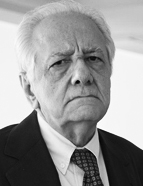

This increasing emphasis on narrative led to the textual construction of Rubro Veio... (1986). Still a product of the intellectual discoveries he had made in Paris, this work was completed in Lima, Peru, during his tenure at the Brazilian Embassy (1984-1986). While serving as Consul General of Brazil in Lisbon from 1987 to 1991, Evaldo Cabral de Mello immersed himself in archival research, including at the Torre do Tombo, this research was essential to the writing of O nome e o sangue... (1989) [Name and blood... (1989)]. In this work, by exploring a genealogical forgery that concealed the New Christian origins of one of his characters, Cabral de Mello shed light on key aspects of the mentality of those who lived through the Ancien Régime in Portugal and Spain. In this work, the historian also provided clues into his writing process, describing how he organised and preserved relevant documents to allow for closer reference in the future. In O nome e o sangue, Evaldo Cabral de Mello illustrated how a certain New Christian aristocrat faced minimal interference from the Inquisition in Brazil by noting that this individual was not even summoned by the Holy Office to discuss a slave who was prosecuted for blasphemy. Only a few years later did Evaldo Cabral de Mello’s audience learn more about the peripeteia and resistance of "José, mulatto , slave of Fernão Soares", the protagonist of his article Como manipular a inquisição para mudar de senhor [How to Manipulate the Inquisition to Change Masters] (1992), an essay that can exemplify the researcher’s use of microhistory, drawing from a detailed study of a criminal case. Evaldo Cabral de Mello has not been immune to historiographical controversies. As a sceptic of historical commemorations due to their political uses of the past, he was one of the most vocal critics of the events marking the 200th anniversary of King João VI’s arrival in Brazil. Evaldo Cabral de Mello's thesis asserts that the Portuguese Court's move to Rio de Janeiro in 1808 had little impact on the unity of Brazil, a view that contrasts sharply with the perspective of José Murilo de Carvalho (D. João VI e as histórias dos Brasis [King João VI and the histories of the Brazils], 2008). Above all, this event resulted in increased taxes imposed on the provinces, particularly Pernambuco, and this discontent was one of the factors leading to the Pernambucan Revolt of 1817. To celebrate the bicentenary, then, would be to participate in a "feast of spoliation" imposed on some provinces to sustain the Court's bureaucratic apparatus (M. Hélio, A festa da espoliação [The feast of spoliation], 2008).
This work is financed by national funds through FCT - Foundation for Science and Technology, I.P, in the scope of the projects UIDB/04311/2020 and UIDP/04311/2020.
